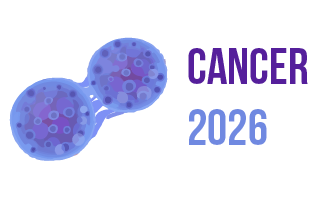4th International Conference on
Innovations and Advances in Cancer Research and Treatment
October 08-09, 2026 | Tokyo, Japan

Cancer 2026

Wake Forest School of Medicine, USA
Abstract:
The development of immunotherapies represents a significant advance within clinical oncology, but its efficacy is confined to a subset of patients, and the emergence of acquired resistance is increasingly apparent. Unlike conventional chemotherapy, which often results in measurable changes in tumor size, evaluating responses to immune checkpoint inhibitor therapy proves challenging due to its unique mechanism and the frequent occurrence of disease progression before tumor regression. Consequently, identifying biomarkers of therapeutic response becomes pivotal in formulating strategies to enhance overall response rates.In our current investigation, we conducted a retrospective analysis of peripheral blood mononuclear cells (PBMCs) and plasma obtained from patient blood draws before initiating treatment and then three weeks after the first cycle of therapy for those with metastatic non-small cell lung cancer undergoing immune checkpoint inhibitor therapy; participants are enrolled in an ongoing Wake Forest Phase II clinical trial (NCT04253964) that is evaluating the impact of ECOG Performance Status on outcomes in advanced lung cancer. This analysis builds on methodology from a recently published study centered around patients with metastatic melanoma. To determine biomarkers of response we employed single-cell RNA sequencing (scRNAseq) to study the identity and transcriptional profiles of involved cells within patient PBMCs. Transcriptomic clustering consistently identified the major immune cell populations expected in PBMCs: monocytes, natural killers, B cells, and T cells. Graph-based cluster analysis further uncovered transcriptional variations, allowing the identification of multiple immune cell subpopulations within these major clusters. Pathway enrichment analysis of the T cell population revealed that one of the top regulated pathways is oxidative phosphorylation which includes genes related to the mitochondrial electron transport chain and mitochondrial membrane integrity. To determine whether response is related to regulation of this pathways PBMCs were subjected to cellular respiration analysis. Our data demonstrates that patients that respond to immunotherapy have a 2-fold (p<0.001) increase in respiratory capacity when compared to non-responders suggesting that mitochondrial function is associated with response. We further validated these observations in our cell population and observed that patients that do not respond to immunotherapy have lower mitochondrial membrane potential relative to patients that respond. In summary, our research introduces a novel set of tools for integration into clinical practice. These tools enhance clinical decision-making, enabling the prediction of therapeutic responses and facilitating the implementation of personalized treatment approaches to enhance the outcomes of cancer immunotherapy.
Biography:
I’m a resident physician in Internal Medicine training at Atrium Health Wake Forest University Baptist Medical Center. My interests include global health as well as medical-entrepreneurship. Ultimately, I hope to specialize further through fellowship and combine my life experiences to bring about comprehensive, empathetic, evidenced-based care and develop a career where my impact is felt on more than one patient at a time.
Always looking for new and interesting opportunities to diversify my career outside of purely clinical medicine!
